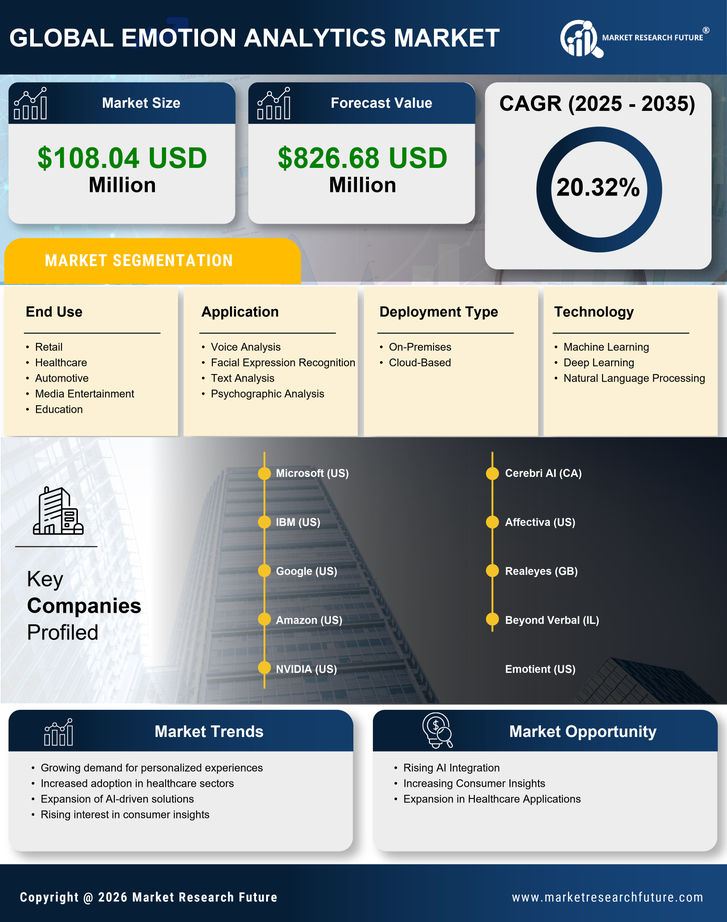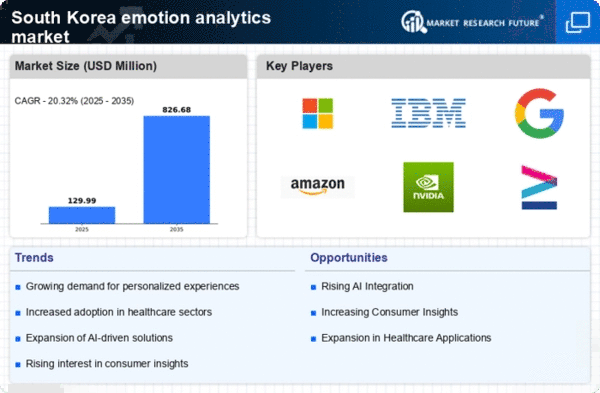Growing Focus on Mental Health Awareness
The heightened awareness surrounding mental health issues in South Korea is influencing the emotion analytics market. Organizations are increasingly recognizing the importance of emotional well-being, leading to a surge in demand for tools that can assess and analyze emotional states. This trend is particularly relevant in workplaces, where companies are implementing emotion analytics to monitor employee satisfaction and mental health. Research indicates that businesses that prioritize emotional well-being can see a 20% increase in productivity. Consequently, the emotion analytics market is likely to experience growth as more organizations seek to implement these tools to foster a healthier work environment and improve overall employee morale.
Rising Demand for Personalized Marketing
The increasing emphasis on personalized marketing strategies is driving the emotion analytics market in South Korea. Businesses are recognizing the value of understanding consumer emotions to tailor their marketing efforts effectively. According to recent studies, companies that utilize emotion analytics can enhance customer engagement by up to 30%. This trend is particularly evident in the retail and e-commerce sectors, where brands leverage emotional insights to create targeted campaigns. As consumers seek more relevant and emotionally resonant experiences, the demand for advanced emotion analytics tools is likely to grow. This shift not only enhances brand loyalty but also contributes to higher conversion rates, thereby propelling the overall growth of the emotion analytics market.
Advancements in Technology Infrastructure
The rapid advancements in technology infrastructure in South Korea are significantly impacting the emotion analytics market. With the proliferation of high-speed internet and mobile connectivity, businesses are increasingly adopting sophisticated analytics tools to capture and analyze emotional data. The integration of cloud computing and big data technologies allows for real-time processing of vast amounts of emotional data, enabling companies to make informed decisions swiftly. As organizations invest in these technologies, the emotion analytics market is expected to expand, with projections indicating a growth rate of approximately 25% annually. This technological evolution not only enhances data accuracy but also facilitates the development of innovative applications in various sectors, including healthcare and entertainment.
Emergence of Emotion-Driven Product Development
The emergence of emotion-driven product development is reshaping the landscape of the emotion analytics market. Companies are increasingly leveraging emotional insights to inform their product design and development processes. By understanding consumer emotions, businesses can create products that resonate more deeply with their target audience. This trend is particularly pronounced in the technology and consumer goods sectors, where emotional appeal can significantly influence purchasing decisions. Research indicates that products developed with emotional insights can achieve up to 40% higher sales compared to those that do not consider emotional factors. As a result, the emotion analytics market is poised for growth as more companies recognize the value of integrating emotional data into their product development strategies.
Integration of Emotion Analytics in Customer Service
The integration of emotion analytics into customer service operations is becoming a pivotal driver for the emotion analytics market. Companies in South Korea are increasingly utilizing emotion recognition technologies to enhance customer interactions. By analyzing emotional cues during customer interactions, businesses can tailor their responses and improve service quality. This approach not only leads to higher customer satisfaction rates but also reduces churn. Studies suggest that organizations employing emotion analytics in customer service can achieve a 15% improvement in customer retention. As the competition intensifies, the adoption of emotion analytics in customer service is likely to become a standard practice, further propelling the growth of the emotion analytics market.

















